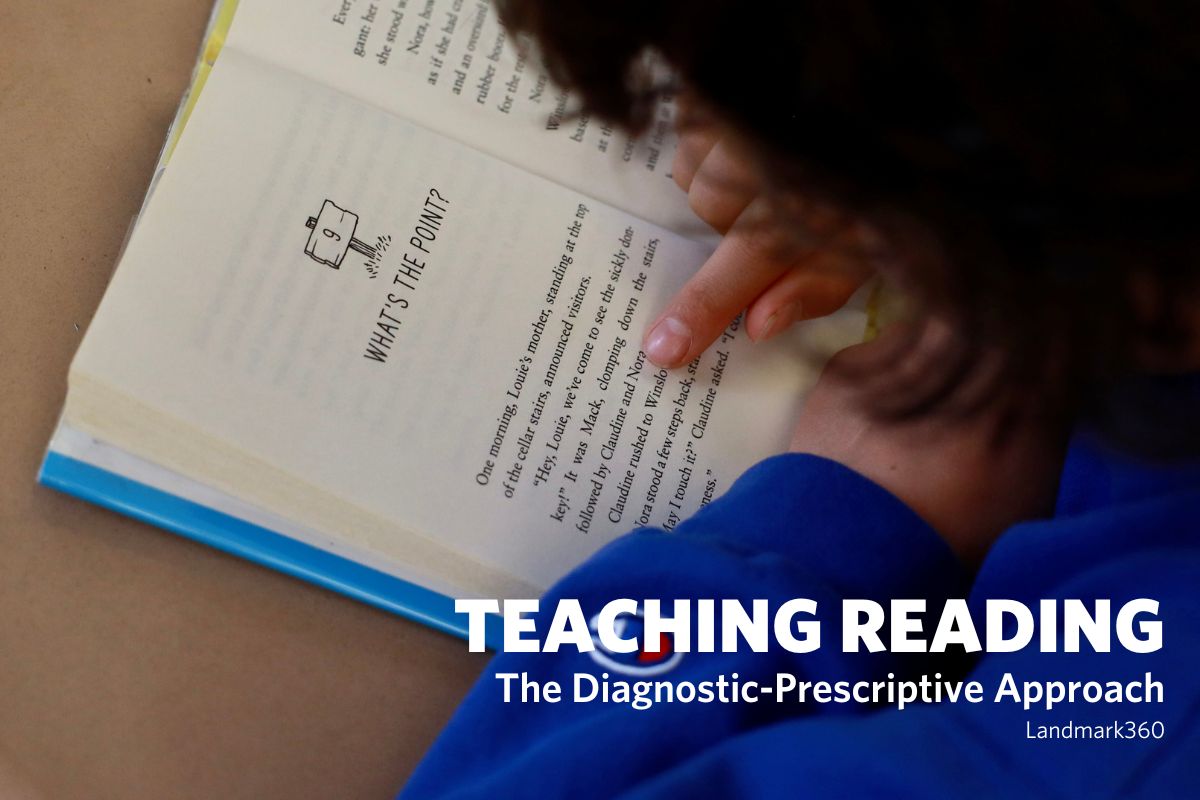- Our School
- Our Advantage
- Admission
- Elementary•Middle School
- High School
- Summer
- Giving
- Parent Resources
- For Educators
- Alumni
Landmark 360 Blog
Practical, informative resources, tips, tools, and strategies for parents of children with learning disabilities written by experts in the fields of Learning, Learning Disabilities, Social & Emotional Topics, College Prep, and Teaching.
Now viewing articles in the category Teaching.
AI Can Help Reading Instruction
March 6th, 2024

AI can finally give students with dyslexia and other learning differences the personalized lessons needed to help them work with — instead of work around — their disability. Used strategically, AI can help teachers design for students’ many different learning styles.
Posted in: TeachingJust Effective Teaching
December 15th, 2023
This article refreshed from a 2013 version. Although it was a long time ago, I can still remember the feeling I had entering my first public school teaching job. I was hired to teach four sections of 9th grade Civics classes and one section of an 11th grade honors US history class. Mainstream ... Posted in: Teaching
Posted in: TeachingLandmark’s Founding Principles: Part Three
March 15th, 2023

Learn about Landmark School's founding principles in Part Three of this series by Bob Broudo.
Posted in: TeachingLandmark's Founding Principles: Part Two
December 13th, 2022

Learn about Landmark School's founding principles and the birth of the Outreach program.
Posted in: TeachingLandmark's Founding Principles: Part One
November 8th, 2022

Learn about Landmark School's founding principles.
Posted in: TeachingTeaching Reading
October 31st, 2022

The Diagnostic-Prescriptive Approach. Reading is a complex neurological process—a highly-valuable cultural invention that must be deliberately and systematically taught to each generation.
Posted in: TeachingSix Teaching Principles: #6 Include Students in the Learning Process
May 29th, 2021
DEFINITIONStudents are not passive receptacles to fill with information. They come to class with their own frames of reference.Their unique experiences and knowledge affect them as learners and should be taken into account. Therefore, during every exercise, teachers should accept student input as mu... Posted in: Teaching
Posted in: TeachingSix Teaching Principles: #5 Provide Models
May 28th, 2021
DefinitionProviding models is simple, yet very important. It is one of the most effective teaching techniques.Models are concrete examples of what teachers expect. They do not mean that teachers are doing assignments for students. They are standards to which students can compare their own work. A mo... Posted in: Teaching
Posted in: TeachingSix Teaching Principles: #4 Ensure Automatization Through Practice and Review
May 27th, 2021
DefinitionAutomatization is the process of learning and assimilating a task or skill so completely that it can be consistently completed with little or no conscious attention.Repetition and review (spiraling) are critical. Sometimes students appear to understand a concept, only to forget it a day, ... Posted in: Teaching
Posted in: TeachingSix Teaching Principles: #3 Micro-Unit and Structure Tasks
May 26th, 2021
DefinitionEffective teaching involves breaking information down into its smallest units and providing clear guidelines for all assignments.This is especially important for students with learning disabilities. Micro-uniting and structuring are elements of directive teaching, which Landmark consistent... Posted in: Teaching
Posted in: TeachingSix Teaching Principles: #2 Use Multisensory Approaches
May 25th, 2021
DefinitionMultisensory teaching is effective for all students. In general, it means presenting all information to students via three sensory modalities: visual, auditory, and tactile.Visual presentation techniques include graphic organizers for structuring writing and pictures for reinforcing instru... Posted in: Teaching
Posted in: TeachingSix Teaching Principles: #1 Provide Opportunities for Success
May 24th, 2021
DefinitionProviding students with opportunities for success is key. Failure and poor self-esteem often result when teachers challenge students beyond their ability.Landmark begins teaching students at their current level of ability. This approach improves basic skills and enhances confidence. As Lan... Posted in: Teaching
Posted in: TeachingLandmark's Six Teaching Principles
May 23rd, 2021
By Rob KahnMany professional visitors to Landmark wrap up their visits by observing: “It’s really remarkable to see the same materials and methods used by teachers in many different classes.” That’s no accident. Visualize Landmark as an inverted pyramid. The pyramid’s wide base is 475 stud... Posted in: Teaching
Posted in: TeachingDear Teaching
December 9th, 2020
Dear Teaching, This year has been a tough one for us. Our relationship has been through so much over the past 12 months. We’ve been forced to change our ways, go long distance, and test our commitment to each other like never before. Yet despite all that, my love for you remai... Posted in: Teaching
Posted in: TeachingThe Whole Language vs Phonics Controversy Rages On
June 4th, 2019
By Donna J. Sullivan, M.A.What a surprise it was to learn that controversy regarding the teaching of beginning reading is still alive and well! Specifically, I recently learned that what is known as the whole language philosophy is still alive and breathing, despite the large body of highly scie... Posted in: Teaching
Posted in: TeachingSynthetic Phonics Accelerates Reading and Writing in Young Students
September 26th, 2018
By Jennie Smith-Brock, M.S. It’s day eight of kindergarten in a public school in New England and the students are putting out their arms like the wings of airplanes " /nnnnnnnnn/," whisking ants off their arms " /aaaaa/," and puffing out candles (their fingers) "/p/." “Nap!,” call out some ... Posted in: Teaching
Posted in: TeachingExecutive Function 101: Balance
May 1st, 2018
This is the fifth post in a five-part series about Executive Function. Each post includes downloadable templates to use at home and in the classroom. The first article is about managing time, the second addresses managing materials, the third discusses managing information, and the fourth achieving ... Posted in: Teaching
Posted in: TeachingExecutive Function 101: Independence
April 22nd, 2018
This is the fourth post in a five-part series about Executive Function. Each post includes downloadable templates to use at home and in the classroom. The first article is about managing time. The second addresses managing materials, the third addresses managing information, and the fifth finding ba... Posted in: Teaching
Posted in: TeachingExecutive Function 101: Information
April 10th, 2018
This is the third post in a five-part series about Executive Function. Each post includes downloadable templates to use at home and in the classroom. The first article is about managing time. The second addresses managing materials, the fourth achieving independence, and the fifth finding balan... Posted in: Teaching
Posted in: TeachingExecutive Function 101: Materials
April 3rd, 2018
This is the second post in a five-part series about Executive Function. Each post includes downloadable templates to use at home and in the classroom. The first article is about managing time, the third addresses managing information, the fourth achieving independence, and the fifth finding balance... Posted in: Teaching
Posted in: TeachingExecutive Function 101: Time
March 27th, 2018
This is the first post in a five-part series about Executive Function. Each post includes downloadable templates to use at home and in the classroom. The second article is about managing materials. The third addresses managing information, the fourth achieving independence, and the fifth finding bal... Posted in: Teaching
Posted in: TeachingExecutive Function 101
February 25th, 2018
Executive function deficits are very common among young people, especially those with ADHD, dyslexia, and other learning differences. These challenges show up as weaknesses in getting and staying organized, managing time, planning and prioritizing, and initiating tasks. Sound familiar? It shou... Posted in: Teaching
Posted in: TeachingThe Importance of Purposeful Play in Early Education
July 30th, 2017
Every time you see a child playing superheroes, digging in the sand, or chasing a classmate at recess, they are playing with purpose. To a casual observer, it may seem like they are just having fun and being kids. But it all has value and meaning to a child. “Purposeful play” can be play that’... Posted in: Teaching
Posted in: TeachingBeyond Gold Stars: Fostering Intrinsic Motivation in Struggling Readers
July 13th, 2017
Every summer, struggling readers in first through fourth grade participate in Tufts University’s Summer Reading Program for a month of remediation—and empowerment. Some skip through the door, seemingly filled with mirth at the idea of their alternative “summer camp.” Others are hesitant. The... Posted in: Teaching
Posted in: TeachingMay Is Better Hearing and Speech Month
May 4th, 2016
By Linda Gross, M.A., CCC-SLP In recognition of May Is Better Hearing and Speech Month here are some classroom tips to help students. While these tips are meant for the classroom, they can be applied in almost any setting. Avoid asking, “Do you understand?” or “Does that make sense?” Rathe... Posted in: Teaching
Posted in: TeachingIt's the Most Wonderful Time of the Year
September 8th, 2015
By Mark Drago There is an old Staples back to school commercial where the dad skips down the aisle and his kids trudge behind him as the song “It’s the Most Wonderful Time of the Year” plays in the background. A totally different portrayal of the start of school from pop culture is John Green... Posted in: Teaching
Posted in: TeachingConnected Letters, Connected Thinking: How Cursive Writing Helps Us Learn
August 21st, 2015
By Judy Packhem, M. Ed.Cursive writing is an endangered species these days. Left out of the Common Core State Standards, cursive is now seen as inconsequential, and even obsolete, by some in the education community.This is distressing to me, and it should be to all of you who care about educating o... Posted in: Teaching
Posted in: TeachingThe Teaching Brain
April 14th, 2015
Submitted by Vanessa Rodriguez We’ve been hearing long, loud, and numerous complaints about the state of education and the need for radical reform of our educational system. We’ve heard about the limitations of high stakes standardized testing and the need for more accountability for our teache... Posted in: Teaching
Posted in: TeachingAn Interview with Vanessa Rodriguez
March 24th, 2015
Dr. Jessie Voigts from Wandering Educators recently reviewed Landmark360 expert blogger Vanessa Rodriguez’s latest release, The Teaching Brain: An Evolutionary Trait at the Heart of Education. Below you will find a brief review and interview with the author. “Let me tell you about “The Teach... Posted in: Learning Disabilities, Teaching
Posted in: Learning Disabilities, TeachingLessons Learned While on the Road with Landmark Outreach
January 14th, 2015
By Adam Hickey, Ed.M, M.S. Ed. The Landmark School Outreach Program has a long and storied history of extending Landmark School’s influence beyond the campuses of Manchester and Prides Crossing. Although charged through its mission to empower children and adolescents with language-based learning... Posted in: Teaching
Posted in: TeachingDancing in the Rain
April 28th, 2014
Submitted by Amy Ruocco We are all faced with challenges in life, but how successfully we navigate through those challenges largely depends on how capable we view ourselves to be. Dyslexic children learn fairly early on that their peers are able to conquer tasks that are seemingly insurmountable ... Posted in: Teaching
Posted in: TeachingWhy I Don't Teach Tolerance
October 12th, 2013
Submitted by Ariel Martin-Cone I was asked to write this blog piece about teaching tolerance, but I want to start by changing some vocabulary. Teaching tolerance promotes that idea that you just need to put up with something you don't particularly value or enjoy (Brussels sprouts, regular exercis... Posted in: Teaching
Posted in: TeachingBuilding a Culture of Character
January 7th, 2013
Submitted by Bob Broudo Being “peaceful,” or at least making the effort to become peaceful, is often associated with the holidays. However, the arrival of the holidays this year (2012) was accompanied by horrific visions of school violence that conjured up other visions of violence in movie t... Posted in: Teaching
Posted in: Teaching








.jpg?v=1652115432307)














